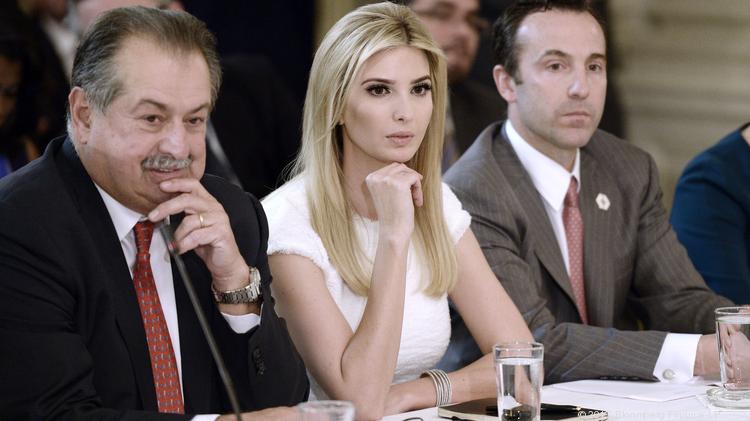Reed Cordish
Assistant to the President for Intragovernmental and Technology Initiatives at the White House
Reed Cordish is one of the richest members of Trump’s administration
An article in the New York Times this weekend showed that Reed S. Cordish, whose family runs the Baltimore-based Cordish Cos., is one of the wealthiest members of the Trump administration.
Cordish’s assets were valued at between $197.2 million and $424 million, among the top tier in the wealth-laden cabinet and administration of President Donald Trump. Cordish has been assistant to the president for intragovernmental and technology initiatives at the White House since mid-January. He is a close personal friend of Ivanka Trump and her husband Jared Kushner, both executives in the Trump administration.
“The New York Times reported that the power couple, who both have executive positions in the administration, are worth at least $241 million. Education Secretary Betsy DeVos is the richest member with at least $579.7 million in assets, the Times reported.
The 66-page financial disclosure form that Cordish filed with the federal government after his appointment showed details of his assets in several executive roles. For a look at the entire filing, click here.
• Cordish listed himself as a principal at Baltimore-based CTR Management Inc. from June 1998 through January 2017, when he assumed his current position as CTR Management Inc. is based at Cordish Cos. headquarters downtown, state records show, and was formed in June 1989.
• Cordish’s disclosure form also lists him as president of Entertainment Consulting International LLC from November 2011 through January and principal of PPE Casino Resorts Maryland Developer LLC from January 2013 through January 2016. Both are based in Baltimore, the filing shows, and state records show they are housed at 601 E. Pratt St. where Cordish Cos., a national development, hotel, gaming and entertainment company are based in the Power Plant Live building.
The Cordish assets listings, garnered from a series of financial disclosure statements released from the White House on Friday, offered a rare glimpse into the holdings of the private family-owned and run company that began humbly in 1910 in the Baltimore-Washington metropolitan area.
David Cordish, Reed Cordish’s father and chairman and CEO of the company that owns the Maryland Live Casino in Anne Arundel County and Power Plant Live downtown among several other entertainment and gaming venues, could not be reached for comment.”
“Foxconn, the technology giant that supplies gadgets to Apple, Google and Amazon, has shown willingness to make a huge investment in Wisconsin — in exchange for a similarly hefty commitment from the state.
The Taiwanese company has agreed to build a factory that will stretch 20 million square feet, the size of 11 football fields, and Gov. Scott Walker has offered a set of financial rewards to seal the deal.
On the table is up to $3 billion in state tax breaks. The state legislature could approve the economic incentive package as early as August.
That works out to a rough cost to the state of about $230,700 per worker, assuming the factory goes on to generate 13,000 jobs.
The coming plant represents a political victory for Walker, who bills himself a jobs creator and who faces reelection next year, as well as for Trump, who has made American manufacturing central to his economic agenda.
Foxconn has so far committed to creating 3,000 jobs at the plant by 2020, with an average yearly wage of $53,000. The company said in a statement to The Washington Post that the number has the “potential to grow” to 13,000.
Approval of the full incentive package would mean Foxconn, which made nearly $140 billion in revenue in 2015, could net up to $1.5 billion for creating Wisconsin jobs and another $1.35 billion for building the plant in the state’s southeast area.
Foxconn said it will pour $10 billion of its own money into the plant, which Walker’s office described as “three times the size of the Pentagon.”
An estimated $5.7 billion of that amount will go toward construction and equipment from Wisconsin businesses, a spokeswoman for Walker said. Neither the state nor Foxconn would say how much of the investment would fund automation.
Foxconn would also be allowed to skip another $150 million in sales tax on purchases such as building goods.
After President Trump, along with Foxconn chairman Terry Gou, announced the deal Wednesday, Walker called it a “once-in-a-century opportunity” for his state.
“We are calling this development ‘Wisconn Valley,’ ” he said, speaking from the East Room of the White House, “because we believe this will have a transformational effect on Wisconsin just as Silicon Valley transformed the San Francisco Bay area.”
Walker proposed the tax incentives to beat six other states in the quest for the factory. Indiana, North Carolina, Ohio, Texas, Pennsylvania and New York were also in the running.
The federal government won’t offer Foxconn any new tax breaks, a senior White House official said. But Trump said he personally discussed the deal with Foxconn chairman Gou.
“I would see Terry, and I would say ‘Terry, you have to give us one of these massive places you do great work with,’ ” Trump said Wednesday.
The announcement came about six months after Foxconn pledged to create between 30,000 and 50,000 jobs in the United States.
Martha Laning, chairwoman of the Democratic Party of Wisconsin, said she applauded Walker’s move to bring more jobs to Wisconsin but questioned the terms of the deal. Foxconn, she said, has a history of making promises without delivering on them.
“We want to see this proposal,” she said. “This is the largest investment that Wisconsin has ever done, so we are cautiously moving forward and asking: What is the return on investment for Wisconsin taxpayers?”
The company caught a reputation in the past for abandoning plans. Four years ago, Foxconn unveiled a plan to build a new $30 million plant in Pennsylvania, and the state’s governor praised the move.
But after the political attention faded, Foxconn never built that factory.
Mark Muro, an economics scholar at the Brookings Institution, a Washington think tank, said he expects global firms will increasingly consider moves to the United States to slash shipping costs.
Earlier this summer, Samsung cited proximity to American customers for its plans to open a new factory in South Carolina.
“Flat-screen displays are large enough to be costly to ship,” Muro said. “Time to market is becoming an important aspect of these decisions.”
States, meanwhile, will likely have more opportunities to compete for the next generation of factories, he said. Take Tesla’s Gigafactory, which will make batteries in Nevada. The state beat four others for the facility by offering $1.3 billion in tax benefits over the next two decades.” Washington Post

